The Changing Face of Our Oceans Part 7: Tentacle Monsters From The Deep
Part 1, Part 2, Part 3, Part 4, Part 5, Part 6
Lately, the ocean seems to be coming up all tentacles. Sea jellies aren't the only tentacled sea beasties being helped out by human damage to the oceans- cephalopods are doing pretty well too. The cephalopods are a group of tentacled molluscs that include octopi, squid, nautiluses, and cuttlefish, as well as several extinct types.
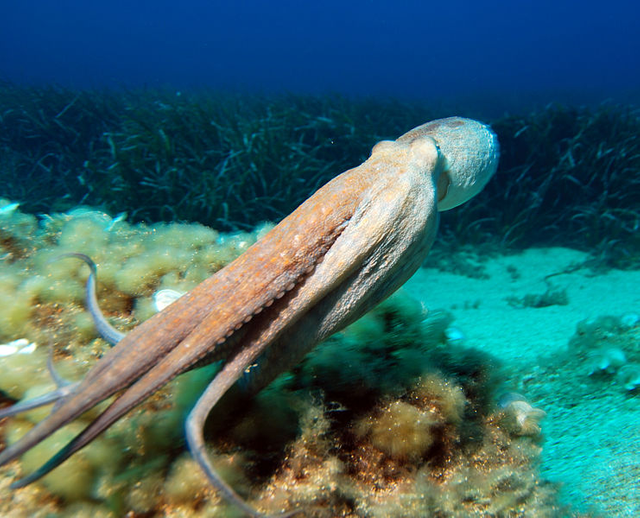
A swimming octopus. Octopi swim headfirst, with their tentacles trailing behind them. [Image source]
The cephalopods are without question the crowning achievement of molluscan complexity. They're the most intelligent class of invertebrate animals by far, especially octopi, many of which are improvisational tool users. They're also as distant of relatives as animals get to us- we're much more closely related to cockroaches or spiders than we are to any cephalopod. They can change colors far swifter than any chameleon, they can think with their tentacles, they can spray clouds of concealing ink, they can do all sorts of crazy tricks.
The most important aspect of cephalopods as far as marine ecology and evolutionary history, however, isn't any of the amazing things they can do- it's the fact that they're the single most delicious thing in the ocean. That sounds a little weird, I know- I personally think they're tasty, but there's tons of people that don't, and even I won't go out of my way to find them. For fish, toothed whales, and other predators, however, there's really nothing better than a squid or octopi snack. This is because they are an incredibly nutrient rich food source with little to nothing in the way of bones. (Squids have one small bone and a beak, octopi just have the beak.) They've been called swimming protein bars by some scientists.
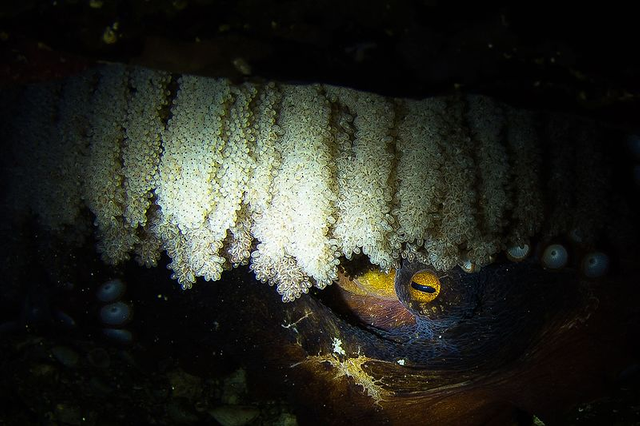
A female giant Pacific octopus guarding her strings of eggs. [Image source]
The inherent tastiness of cephalopods has resulted in some very specific adaptations on their part. First off, they fall far to the side of producing huge numbers of offspring. The giant Pacific octopus (I've actually seen one of these guys dead in a tide pool before!) is known to produce 10,000 to 70,000 fertilized eggs. The female will guard the eggs for the five months it takes them to hatch, then dies right afterwards. Similarly huge numbers of offspring are produced by many other squid and octopi species. Cuttlefish and nautiluses take a slightly different strategy, but we'll talk about that later. Because of their absurdly high reproduction rate, cephalopod biomass in the oceans gets absurd.
Scientists once pumped the stomachs of sixty elephant seals on an island in South Georgia, and found that their stomachs were 96.2% filled with squid. They calculated that the elephant seal inhabitants of that single island eats at least 2.3 million tons of squid per year. For context, the world's largest human fishery is for Peruvian anchoveta, a small fish used to make fish oil and fish meal, and it only totals around 3 million tons per year. All of our fisheries are dwarfed by squid biomass, and we're still badly damaging fish populations. The only way squid populations are managed is by intense predation by literally everything else in the oceans, along with seabirds and humans. They're a keystone species for many ocean ecosystems- a one-size-fits-all prey species.
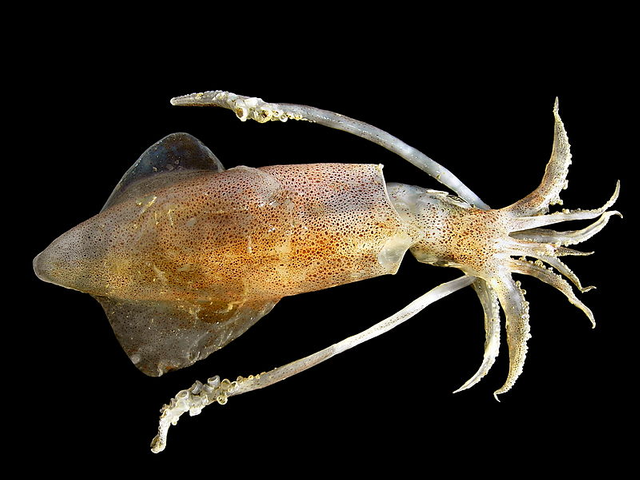
The European squid, Loligo vulgaris. Lays up to 20,000 eggs at a time. [Image source]
The other major adaptation cephalopods have is their incredibly fast metabolisms and short lifespans. Most cephalopods only live a year or two. It's actually a sensible evolutionary strategy- when odds are you're going to get eaten, why bother trying to live a long time? Cephalopods grow incredibly quickly because of that, especially, again, squids and octopi. This contributes their ability to survive being prey to everything else. So as we continue to overfish the oceans, there is suddenly much less to hold their populations down.
Many cephalopods are also quite capable of surviving low oxygen zones of the ocean, allowing them to take advantage of deep anoxic zones and dead zones. This is an excellent adaptation to avoid getting eaten, and it's allowing them considerable success. They're not entirely immune to the effects of the dead zones, so you won't find them deep in their hearts, but they're certainly more tolerant of them than fish. (Not to mention that as invertebrates they're not as vulnerable to many of the neurotoxins in algal blooms.)
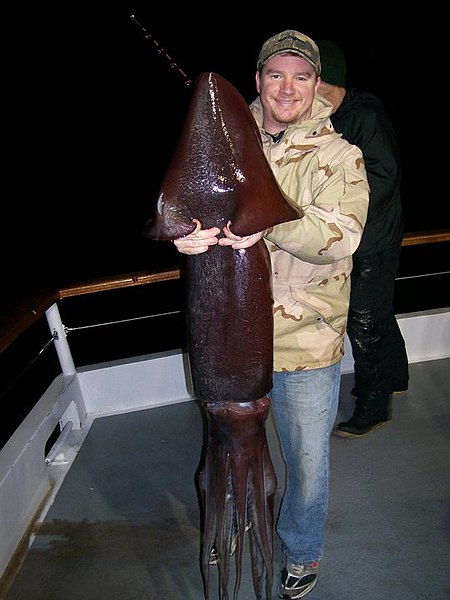
A Humboldt squid captured by a fisherman. Humboldt squid are also known as diablo rojo, or Red Devils, due to their tendency to flash between red and white. [Image source]
Humboldt squids are particularly interesting case examples. These squids grow quite large, often possessing mantles up to five feet long. They produce literally millions of eggs during the single year of their life. They grow incredibly quickly to reach their large size, and are voracious predators that even attack humans (with no confirmed deaths and very few non-superficial injuries, however)- though when not hungry, they're quite inquisitive, friendly, and intelligent. Thanks to human effects on the ocean, their population and geographic range has expanded drastically. These include the warming of ocean waters, the expanse of low oxygen zones they tolerate well, and the reduction in the numbers of predators actually big enough to eat them. They traditionally lived in the Humboldt Current off the coast of South America, but have expanded as far northwards as British Columbia and into Puget Sound- fishermen from Seattle have returned with them in their catches. We can also expect Humboldt squid to show up in much shallower waters, as ocean acidification will likely drive them higher than they usually dwell.
Earlier I mentioned that cuttlefish and nautiluses have taken very different approaches. Both tend to produce much smaller broods than squid or octopi. Nautiluses are far and away the most unusual cephalopods in these regards- they live up to 20 years, and are much slower growing. Both species tend to live fairly deep in the ocean, and are better protected than squids or octopi- nautiluses have armored shells and cuttlefish have a large, durable internal plate. Squids and octopi that live deep in the ocean also tend to have smaller broods as well.
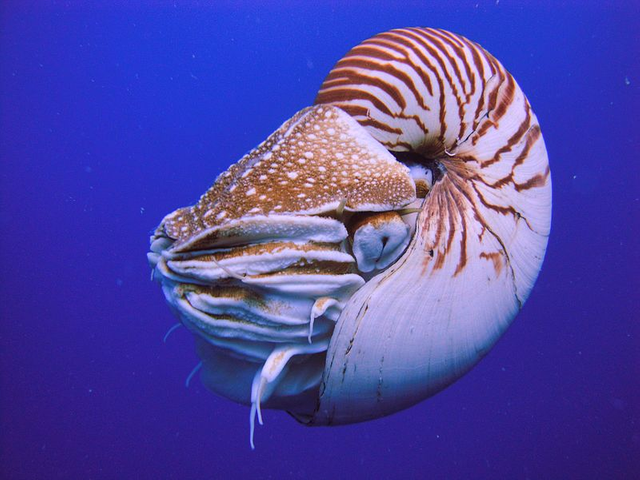
A nautilus, armored cephalopods found in the Indian Ocean. [Image source]
As we further alter our oceans, cephalopods- with the possible and unfortunate exception of nautiluses, which are being overfished by humans for their beautiful shells- are turning out to be clear winners. The future oceanic ecosystem is going to be heavily dominated by tentacled creatures, whether sea jellies or cephalopods, as well as those creatures that dine upon them. You might want to start developing a taste for squid and octopus if you don't already have one.
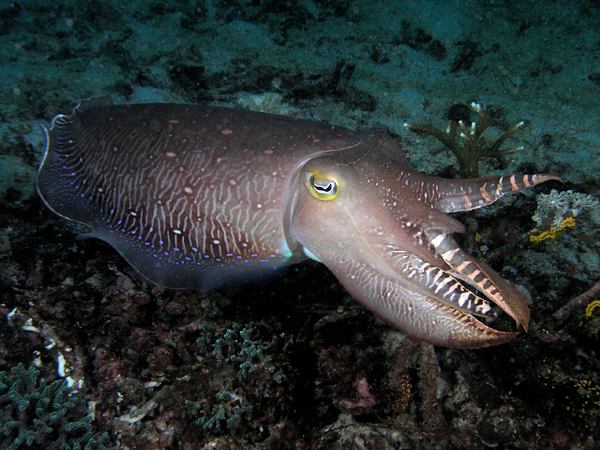
The giant cuttlefish, the largest cuttlefish species. Cuttlefish are skilled color shifters even among cephalopods, able to create beautiful, ever shifting patterns on their skin. They're capable of changing the entire color of their body multiple times per second. [Image source]
Bibliography:
- Squid Empire: The Rise and Fall of the Cephalopods, by Danna Staaf
- Other Minds: The Octopus, the Sea, and the Deep Origins of Consciousness, by Peter Godfrey Smith
- The Ocean of Life: The Fate of Man and the Sea, by Callum Roberts
- https://en.wikipedia.org/wiki/Cephalopod
- https://en.wikipedia.org/wiki/Squid
- https://en.wikipedia.org/wiki/Octopus
- https://en.wikipedia.org/wiki/Nautilus
- https://en.wikipedia.org/wiki/Cuttlefish
- https://en.wikipedia.org/wiki/Humboldt_squid

Being A SteemStem Member
Thanks for showing us at least one less depressing bit of news on how the ocean bio is reacting!
These creatures are amazing! I for one welcome our new cephalopod overlords.
I have to agree that this is less alarming than the population explosion of jellyfish because calamari is so damn tasty. Great work!
Thanks! And yeah, I love it- especially the texture.
I've often heard that cephalopods are one of the most intelligent sea creatures. I wonder if man's polluting the oceans will lead to a future civilization of octopi...
Maybe that's the next Planet of the Apes-type movie. Astronaut travels to a distant planet and finds an undersea civilization. At the end, he finds the Statue of Liberty toppled on the edge of a crevasse on the bottom of the sea floor.
Hah, one of the scripts I've been working on for a while has actually been about that exact thing! (Except they know it's Earth from the getgo when they're returning to it.)
Ha - nice!
):<
MMM calamari
Nautiloids are some of the coolest marine creatures. If I could own any marine organism, I'd keep one of these. They're fascinating to look at, but they don't like to do too much.
This makes me sad. Again... Overfishing... We suck as a species.
They also match the texture of their surroundings to help blend in by way of their papillae.
Cephalopods are some of the most amazing creatures on this planet (maybe any planet).
Seriously, I definitely have quite a few more future posts about cephalopods planned.
Nice one @mountainwashere,
You can take all the proteins and nutrients from it but just beware that some sp. of squids are also reported to attack humans.(seen in NatGeo)
Cheers
Humboldt squids, mainly, though there are no reported deaths from Humboldt squid attacks. There are, however, reported deaths from blue-ringed octopus bites, which are extremely venemous.
You received a 80.0% upvote since you are a member of geopolis and wrote in the category of "ecology".
To read more about us and what we do, click here.
https://steemit.com/geopolis/@geopolis/geopolis-the-community-for-global-sciences-update-4
Your Post Has Been Featured on @Resteemable!
Feature any Steemit post using resteemit.com!
How It Works:
1. Take Any Steemit URL
2. Erase
https://3. Type
reGet Featured Instantly � Featured Posts are voted every 2.4hrs
Join the Curation Team Here | Vote Resteemable for Witness
I've seen videos of octopi being quite clever with tools, like using coconuts as armor or hiding spots, maybe other like-creatures are also clever... Humans being humans, we've dumped a lot of plastic in the ocean, I wonder if octopi have used plastic bags as decoys for fooling their predators...
Speaking of plastic pollution, you're probably already aware of efforts like https://www.theoceancleanup.com/updates/unscheduled-learning-opportunities-on-the-north-sea/ , I hope their prototype tests are successful
That's actually going to be the topic of an upcoming post in this series! I don't know if octopi have used plastic bags this way, though.
Congratulations! This post has been chosen as one of the daily Whistle Stops for The STEEM Engine!
You can see your post's place along the track here: The Daily Whistle Stops, Issue # 63 (3/4/18)
The STEEM Engine is an initiative dedicated to promoting meaningful engagement across Steemit. Find out more about us and join us today!